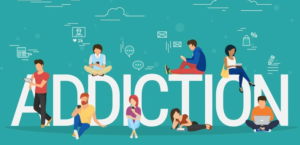
![]() Recently, I had lunch with a family. But I can’t say I enjoyed it. Every few minutes (even between picking up a fork), my daughter pulled her iPhone out and glanced at her text messages or Facebook.
Recently, I had lunch with a family. But I can’t say I enjoyed it. Every few minutes (even between picking up a fork), my daughter pulled her iPhone out and glanced at her text messages or Facebook.
Sometimes, she would scan them. Other times, she would offer no apology and type out a reply to a message. Folks, she is not a teenager. She is 38 and addicted to her phone like a zombie.
It reminded me of an experiment with a lab rat. Every time he pressed a bar in his cage, he received a food pellet. Then the scientist required him to push the bar twice for a pellet. Then three times. Then five times. Then 10 times. And quickly, the rat was a bar-pressing maniac.
Sound like anyone you know?
Don’t get me wrong. Nobody would argue that the speed, efficiency, convenience, and cost savings of smartphones aren’t a blessing.
Still, there can be too much of a good thing. Consider the data collected in recent years, for example…
- Americans check their smartphones an average of 262 times a day. That’s 16 times every waking hour.
- And that’s just the “checking” part. Research shows we touch our phones an average of 2,617 times a day. (That’s counting every click, type, tap, and swipe.) I’m betting your significant other doesn’t get that much attention.
- American adults spend an average of 5.4 hours per day on their phones. For teens, that number jumps to more than seven hours.
- According to research from the American Academy of Child and Adolescent Psychiatry, kids ages 8 to 12 are spending four to six hours a day using electronic media, which includes smartphones, tablets, gaming consoles, TVs, and computers.
- Children who are heavy media users tend to have lower grades than those who are light users. (Yet fewer than half of kids report that their parents set any rules or limits on usage.)
- 95% of all 13- to 17-year-olds now own smartphones. By age 11, 53% of children own one. But they’re not talking much… On average, teens send 67 texts a day. Apparently, there is hardly a thought that doesn’t require instant communication.
- Particularly scary is that nearly 40% of teens admitted that they texted or emailed while driving. (In other words, keep your hands in the 10 and 2 position and your eyes on the oncoming lane.)
You might assume that our time spent texting and surfing the net at least comes out of the hours we would otherwise spend watching TV. The research shows that TV viewing still averages about 3 1/2 hours per day.
![]() We are a nation addicted to electronic media.
We are a nation addicted to electronic media.
Optimists point out that at least people spending time online are reading. That’s good. But studies show that most of the reading we do on the internet is pretty shallow. We skim, scroll, or click through hypertext from page to page. It leads to an inability to concentrate on one article and read it to the end.
Some argue that these links save time and facilitate learning. However, psychologists say that readers on the Internet are often distracted and overstimulated by hypermedia. We give less attention to what we read and remember less of it.
The online environment promotes cursory reading, distracted thinking, and superficial learning. And the more we use it, the less patience we have for long, drawn-out, nuanced arguments – the kind of arguments found, for instance, in books.
Books – including e-books – require calm, focused, and undistracted concentration that allows ideas to germinate and take hold. Deep reading inspires new associations, insights, and occasionally, epiphanies. Thoughts expand. Language grows. Consciousness deepens.
This kind of reading enhances and refines our experience of the world. It strengthens our ability to think abstractly. Deep reading requires the time and attention that cultivate an educated mind. Yet data shows that Americans spend around just 20 minutes a day reading printed matter of any kind.
We’re on the net instead. Even when away from their computers and mobile devices – or on vacation – millions itch to check email, surf the web, or do some Googling. They seek an internet connection the way a man on fire seeks a pond. They have to feel connected.
For many, the digital revolution has put the computer – desktop, laptop, and handheld – in control. The silicon chip is Big Brother, not because electronic media won’t let go of us , but because we can’t let go of it.
I'm sorry about the details. When I was in the men's room at the mall, I saw a man standing next to the urinal, holding his phone in one hand and reading the messages on it. Isn't it wild? Another day, I was walking in the park, which offered beautiful views and a clear blue sky. But I wondered whether many of the folks noticed the same: eyes down, thumbs on tiny keyboards, unaware of their surrounding.
I realize that some people have work or unusual circumstances that require them to stay connected 24/7. But for tens of millions of others, that’s not the case.
We seem to have developed terrific anxiety about wandering off the grid: some fear that if we stop texting, browsing, emailing, tweeting, posting, or snap-chatting, we might disappear.
The electronic media-obsessed seem to have forgotten they have a choice. They can hit the off button and pay attention to something – or someone – else.
So, join the counterrevolution. Look up. Unplug. Get outside.
Or log off and live!
